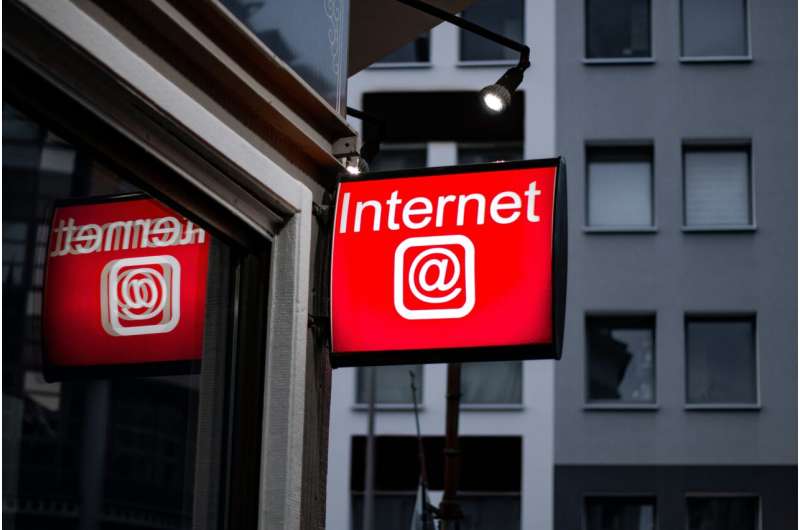
Whether you're apping someone or scrolling through Instagram… all your online behavior is being monitored. In fact, others decide what you actually see. Ph.D. candidate Aleksandre Zardiashvili investigated the impact of online advertising and the power of the companies behind it.
As much as we want to believe it, the internet really isn't neutral. The content we see on our telephones and computers, when we see it and how we see it, is all decided by commercial enterprises with a common goal: to generate as much profit for shareholders as possible.
The two key players are Meta and Alphabet. Zardiashvili conducted research into how consumers can be protected against the rising power of the tech industry: "Most things we do online, whether it's on websites or in apps, happen through the services of these two parties."
Check for yourself: who runs Instagram? Meta. And Facebook? Meta. WhatsApp? Meta. Google search? Alphabet. YouTube? Alphabet. Google Maps? Alphabet.
Every time you use one of these services, the provider tracks your online behavior: the websites you've visited, the apps you've used, your location details and your social media behavior (including clicks, likes and voice commands). As Zardiashvili explains, this is all valuable information that the advertiser then uses to show consumers adverts that align with their own behavior.
Companies such as Meta and Alphabet earn huge sums of money by selling these adverts. Zardiashvili adds that between 2018 and 2022, a large part of Meta's $125 billion revenue stemmed from this kind of advertising, known as "online behavioral advertising" (OBA).
Interesting detail: Meta therefore did not comply with its obligations towards consumers under the EU's General Data Protection Regulation. In other words, it made money from consumers' online behavior, which is actually very personal.
'Free' Instagram account or a paid subscription: Which would you choose?
It's a common misconception that cookie banners—internet pop-ups that require you to tick whether or not you agree to cookies being placed—offer full protection against personalized adverts.
While European legislation does stipulate that tech companies are only permitted to track consumers' search behavior if they have been given permission to do so, for example through cookie banners, most people still unwittingly give away their data.
Zardiashvili continues, "Take Instagram, for example. Consumers who register for the app are given a choice: use the app for free but you'll receive adverts, or take out a subscription for €9 per month and you won't get adverts. The vast majority of people go for the 'free' service." Meta then gets its hands on that behavioral information and sells it on to other parties so that they, too, can target consumers with adverts.
'Enjoy it, but in moderation'
Zardiashvili adds that the extent of online influencing is so great that it puts consumers' human dignity under pressure. "Consumers are human beings. They should be autonomous, free individuals. But personalized advertising involves systematically exploiting people for commercial enterprises' monetary gain.
"How does that affect you as a human being? The message to you and society is that people are less important than the money that is being earned by companies somewhere in Silicon Valley."
In future, Zardiashvili expects society will take a different approach to internet use. He believes that enforcement authorities will publish disclaimers on using the internet—like adverts for alcoholic drinks, where the public is warned about the risks associated with drinking: "Enjoy it, but in moderation." We can expect to see similar warnings about the internet.
So what's the solution?
What can the average consumer do to stand up to tech giants such as Meta and Alphabet? Give up the internet altogether? For most people, that's out of the question. Fortunately, efforts are being made at various levels to guarantee safe internet use.
Zardiashvili is optimistic about these developments, and particularly the measures being taken by the European Union. "I'm feeling hopeful considering the outcomes of my research. A wide range of measures has been implemented and there are more to come. Enforcement authorities have more options for dealing with breaches committed by companies.
"The skeptics only consider one area and complain, for example, that a particular privacy rule is bad or the regulator is wrong. I see that differently. I started my research back in 2019 and if you look at what the European institutions have achieved since then and the vision they have, there's enough reason for optimism."
It's also expected that major players—platforms such as YouTube and Facebook—besides offering a paid subscription or a "free" service, will start offering a new option.
Zardiashvili explains, "Last month, the European Data Protection Board suggested that one way to ensure consumers have a free choice is for big tech companies to provide an alternative free of charge that has no behavioral advertising."
With a bit of luck, then, the value of Zardiashvili's research will be purely historic before too long. In his dissertation, he claims that by 2030, consumer exploitation through online behavioral advertising will essentially have been phased out.
Citation: Gatekeepers of the internet: Why there's no such thing as 'free' internet (2024, May 8) retrieved 8 May 2024 from https://techxplore.com/news/2024-05-gatekeepers-internet-free.html
This document is subject to copyright. Apart from any fair dealing for the purpose of private study or research, no part may be reproduced without the written permission. The content is provided for information purposes only.
